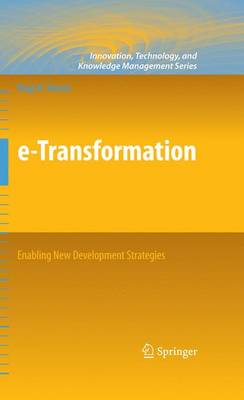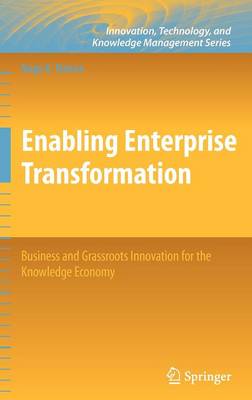Innovation, Technology, and Knowledge Management
4 total works
Could information and communication technology (ICT) become the transformative tool for a new style of global development? Could ICT promote knowledge-based, innovation-driven, and smart, adaptive, participatory development? As countries seek a way out of the present period of economic contraction, they are trying to weave ICT into their development strategies, in the same way organizations have learned to use ICT to transform their business models and strategies. This integration offers a new path to development that is responsive to the challenges of our times.
In e-Transformation, Nagy Hanna identifies the key ingredients for the strategic integration of ICT into national development, with examples from around the world. He draws on his rich experience of over 35 years at the World Bank and other aid agencies to outline the strategic options involved in using ICT to maximize developmental impact—transforming public service institutions, networking businesses for innovation and competitiveness, and empowering communities for social inclusion and poverty reduction. He identifies the key interdependencies in e-transformation and offers a holistic framework to tap network effects and synergies across all elements of the process, including leadership, cyber policies, institutions, human resources, technological competencies, information infrastructure, and ICT uses for government, business, and society.
Integrating analytical insights and practical applications across the fields of development, political economy, public administration, entrepreneurship, and technology management, the author candidly argues that e-transformation, like all bold ideas, faces implementation challenges. In particular, the aspiration-reality gap needs to be systematically addressed if ICT-enabled innovation and transformation is to become a development practice. E-transformation is first and foremost about thinking strategically and creatively about theoptions made possible by the information technology revolution in the context of globalization. To this end, the author provides tools and best practices designed to nurture innovation, select entry points, prioritize among competing demands, and sequence and scale up. He outlines the roles of all participants—political, managerial, entrepreneurial, social and technical—whose leadership is essential for successful innovation.
Transforming Government and Building the Information Society
by Nagy K Hanna
Information and communication technology (ICT) is central to reforming governance, innovating public services, and building inclusive information societies. Countries are learning to weave ICT into their strategies for transforming government as enterprises have learned to use ICT to innovate and transform their processes and competitive strategies. ICT-enabled transformation offers a new path to digital-era government that is responsive to the challenges of our time. It facilitates innovation, partnering, knowledge sharing, community organizing, local monitoring, accelerated learning, and participatory development.
In Transforming Government and Building the Information Society, Nagy Hanna draws on multi-disciplinary research on ICT in the public sector, and on his rich experience of over 35 years at the World Bank and other aid agencies, to identify the key ingredients for the strategic integration of ICT into governance and poverty reduction strategies. The author showcases promising practices from around the world to outline the strategic options involved in using ICT to maximize developmental impact—transforming government institutions and public services, and empowering communities for inclusion and grassroots innovation.
Despite the ICT promise, Hanna acknowledges that reforming governance and empowering poor communities are difficult long-term undertakings. Hanna moves beyond the imperatives and visions of e-transformation to strategic design and implementation options, and draws practical lessons for policymakers, reformers, innovators, community leaders, ICT specialists and development experts.
Private enterprises in advanced economies have been learning to use information and communication technology (ICT) to innovate and transform their processes, products, services and business models, significantly improving productivity and competitiveness. Moreover, the ICT industry itself has become a major source of job creation and a contributor to economic growth and business transformation. A key question today is whether and how developing countries can learn to benefit from the ICT revolution, and what roles the government and private sector can play. Already, a number of developing countries have been inspired by the example of India and China, and are now seeking to jump on the outsourcing bandwagon.
Nevertheless, with few exceptions in the developing world, little attention has been paid by policymakers and practitioners to invest systematically and proactively in ICT-enabled growth, poverty reduction and grassroots innovation. Most communities and small and medium-sized enterprises in developing countries, for example, face multiple constraints to adopting and leveraging this general purpose technology, and lack the capabilities for maximizing its potential.
In "Enabling Enterprise Transformation", Nagy Hanna draws on his rich experience of over 35 years at the World Bank and other aid agencies as a development strategist and ICT policy expert, the most current research, and best practices from around the world to provide practical tools for promoting economic and social transformation through ICT. He assesses various initiatives to develop and diffuse ICT, such as innovation funds, incubators, parks, public-private partnerships, and comprehensive promotion programs. He argues for the strategic options now open for developing countries to participate in ICT production, to deploy ICT to transform industries and services, and to leverage ICT as a new national infrastructure for improving the business environment and enhancing the competitiveness of the whole economy.
The challenge for leaders in developing countries is to create such social and institutional dynamics for learning about ICT use and adaptation at many levels. Lessons gained so far from programs to build these social learning and innovation capabilities at the institutional and grassroots levels should be shared among developing countries, and a dialogue among business leaders, policymakers, development agencies, educational institutions, and the general citizenry must be advanced.



